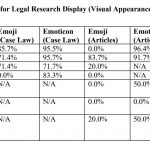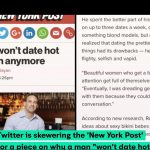
New Paper Explains Why Technologists Should Rally Behind Section 230
At the request of James Grimmelmann, and with his editorial support, I wrote an essay for the Communications of the ACM called “Internet Immunity and the Freedom to Code.” The abstract: The Internet’s freedom to code is in jeopardy. In…

Section 230 Helps Tumblr Defeat Nonconsensual Pornography Suit–Poole v. Tumblr
This ruling came out in March, but it just showed up in my Westlaw alerts. I don’t know why it was delayed over 6 months. The opinion is topical and clear, so I thought it’s still worth blogging now. This…

Legal Research Services Are Struggling With Emojis and Emoticons
Jennifer L. Behrens, a law librarian at Duke Law School, has posted an article: “Unknown Symbols”: Online Legal Research in the Age of Emoji.” She conducted numerous search queries to see how the major legal research services handled case opinions…

E*Trade Defeats Copyright Claim Over Dancing Old Man in Commercial–Vacchi v. E*Trade
Gianluca Vacchi is an Italian entrepreneur. He has a large social media presence, including nearly 12M Instagram followers and 1.8M Facebook followers. He claims his social media presence depicts a fictional alter ego who is “an extravagant millionaire dancing with…

More Teenagers Mistakenly Think “Private” Chat Conversations Will Remain Private–People v. JP
This is a story of four teenage girls and one teenage boy. The girls use the aliases “7Up” (a/k/a JP, the defendant in this case), “Lady Gaga,” “Dream Ruiner,” and “Me.” The boy, called S, allegedly engaged in anti-social behavior…

Partial Screenshot Qualifies as Fair Use (on a Motion to Dismiss)–Yang v. Mic
We’ve blogged about a few cases involving screenshots of newspaper pages consisting of copyrighted photos, including Clark v. TransAlt and Hirsch v. Complex Media. This case adds to that canon, but not in a particularly enlightening way. The screenshot at…

Section 230 Helps Search Engine Defeat “Right to Be Forgotten” Lawsuit–Mosha v. Yandex
Looking holistically at the broad arc of Internet Law history, I could make a good case that the EU’s Right to Be Forgotten marked the beginning of the end of the modern Internet. It was the first time that a…
“Copyright Troll” Lawyer Gets Sanctioned (Again)–Sands v. Bauer Media
Attorney Richard Liebowitz has filed more than 1,100 lawsuits since the beginning of 2016, a campaign this judge calls a “downpour.” This initiative has not gone smoothly. The court recaps: Mr. Liebowitz has been sanctioned, reprimanded, and advised to “clean…
